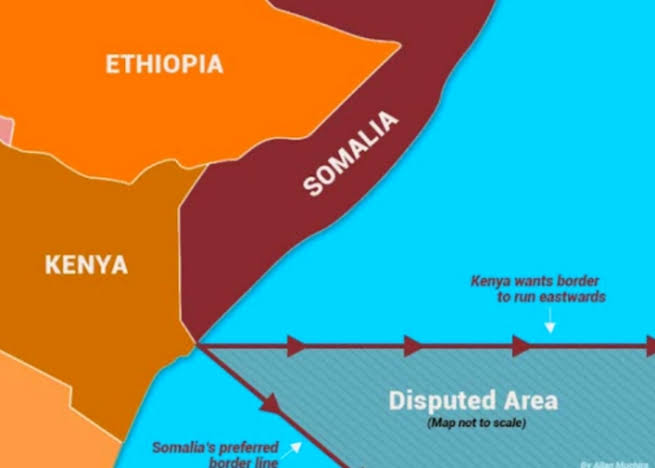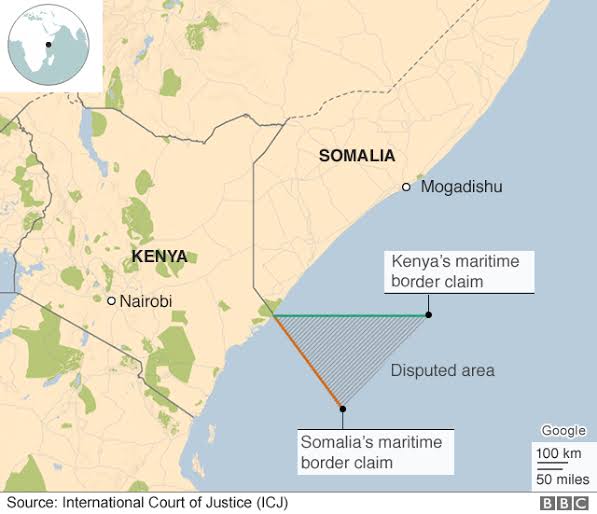
By Faith Nyasuguta
The United Nations’ loftiest court has granted Somalia the control of most of a potentially oil and gas-rich chunk of the Indian Ocean following a bitter legal tussle with neighbouring Kenya over a sea border.
On Tuesday, the International Court of Justice(ICJ) ruled that there was “no agreed maritime boundary” and drew a new border next to the one claimed by Somalia, although Kenya kept a part of the 100,000 square-kilometre (38,000-square-mile) area, chief judge Joan Donoghue said.
Last week, Kenya which had claimed the entire area off the East African coast said that it would decline
to recognise the jurisdiction of the “biased” Hague-based court.
The decision of the court, which is final, may have weighty repercussions for the future relations between two significant nations in one of the globe’s troubled regions.
In 2014, Somalia hauled Kenya to the ICJ over the contested patch of sea.
Central to the dispute is the direction that the joint maritime boundary should take from the point where the land frontiers meet on the coast.

IRREVOCABLE JUDGEMENT
Somalia emphasised that the borderline ought to follow the orientation of its land border and thus head out in a 200 nautical mile line towards the southeast.
Kenya, on the other hand, said its border runs in a straight line due east — a delineation that would have given it a big triangular slice of the sea.
In conclusion, the court drew a line passing nearer to the boundary claimed by Somalia.
Kenyan capital Nairobi, says that since 1979,when it proclaimed the limits of its exclusive economic zone (EEZ) — a maritime territory where a state has the right to exploit resources-, it has exercised authority over the area.
The disputed 100,000-square-kilometre (38,000-square-mile) area is believed to contain rich gas and oil deposits. It also has important fishing rights.
So far, Nairobi has already given exploration permits to Italian energy giant ENI but Somalia is challenging the move.
Any decisions made by the ICJ, which was set up after the second World war to settle disputes between UN member states are indissoluble and they cannot be appealed.
The court, however, has no blatant means of enforcing judgments but can refer violations to the United Nations.
In a corresponding maritime border tussle between Colombia and Nicaragua, the case went back to court in September after Nicaragua accused Colombia of defying a 2012 judgment by the court in its favour.
OBVIOUS BIAS

In March, Kenya pulled out of hearings of the Somalia case after unsuccessfully arguing that the court did not have competence over the case.
Over a fortnight ago, Nairobi told the UN secretary-general that it was withdrawing its 1965 declaration accepting the ICJ’s compulsory jurisdiction.
Kenya’s foreign ministry accused the court of “obvious and inherent bias”.
“As a sovereign nation, Kenya shall no longer be subjected to an international court or tribunal without its express consent,” the Kenyan foreign ministry said.
In 2009, Somalia and Kenya had agreed to settle the dispute via bilateral negotiations but negotiations later broke down in 2014.
Later the same year, Somalia took the matter to the ICJ, indicating that the diplomatic attempts to resolve the row had hit a brick wall.
The Monday verdict could further sour diplomatic relations between the two nations after Kenya in 2019 recalled its ambassador in Mogadishu after accusing Somalia of selling off oil and gas blocks in the contested area.
It tartly reminded Somalia of Kenya’s sacrifices in the fight against Al-Shabaab jihadists.
Kenya is currently a major contributor of troops to AMISOM, an African Union military operation fighting Al-Qaeda-linked fighters waging a violent insurgency across Somalia.




